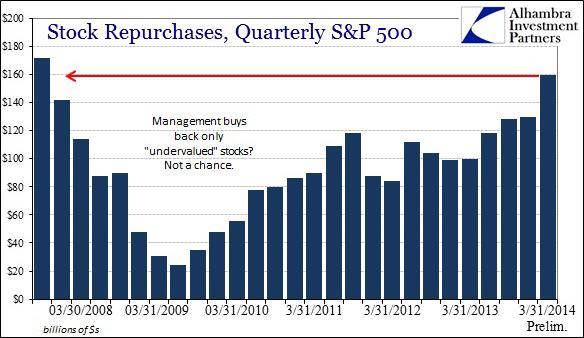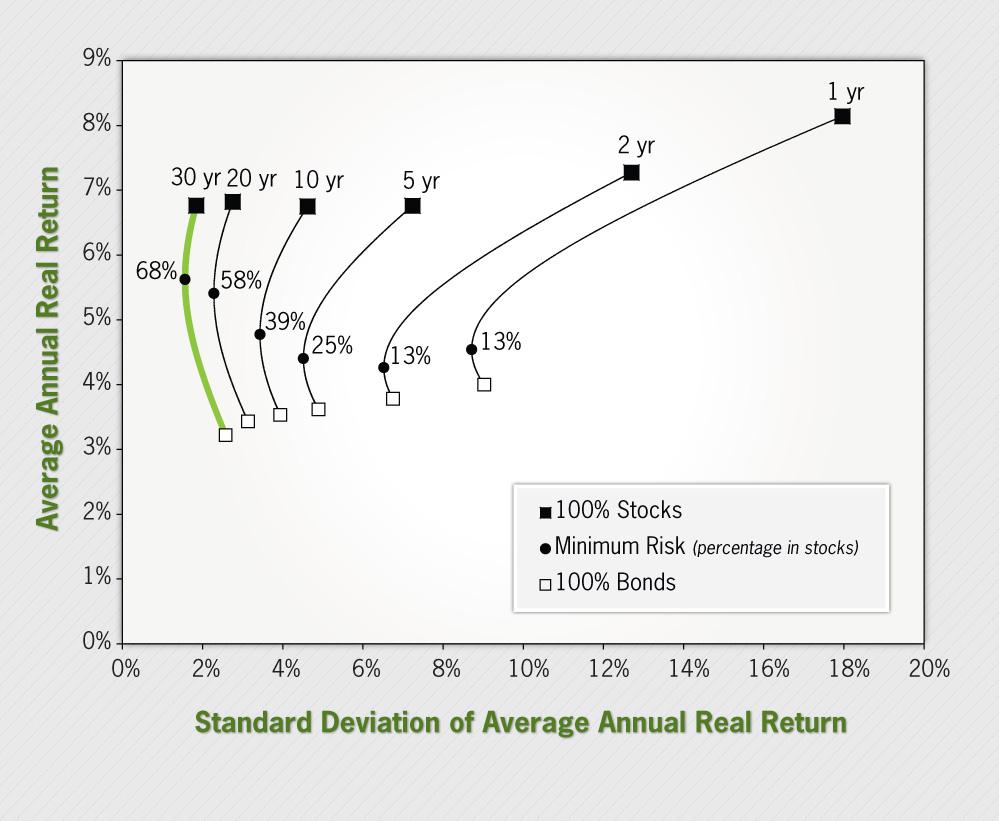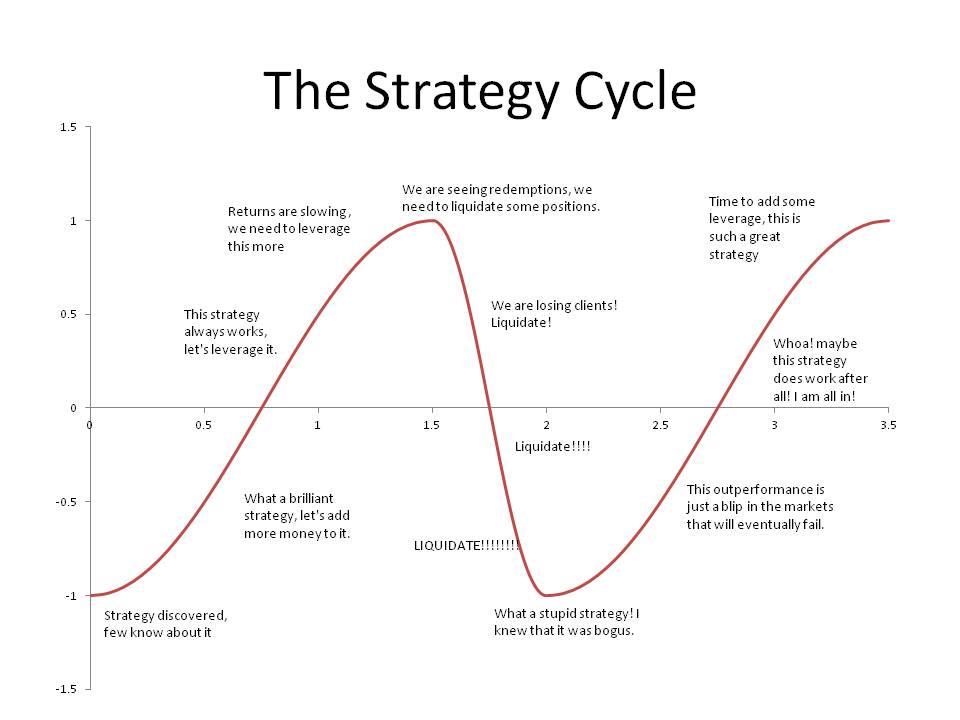One Dozen Reasons Why the Average Person Underperforms In Investing, Part 1

Brian Lund recently put up a post called 5 Reasons You Deserve to Lose Every Penny in the Stock Market. ?Though I don’t endorse everything in his article, I think it is worth a read. ?I’m going to tackle the same question from a broader perspective, and write a different article. ?As we often say, “It takes two to make a market,” so feel free to compare our views.
I have one?dozen reasons, many of which are related. ?I do them separately, because I think it reveals more than grouping them into fewer categories. ?Here we go:
1) Arrive at the wrong time
When does the average person show up to invest? ?Is it when assets are cheap or expensive?
The average person shows up when there has been a lot of news about how well an asset class has been doing. ?It could be stocks, housing, or any well-known asset. ?Typically the media trumpets the wisdom of those that previously invested, and suggests that there is more money to be made.
It can get as ridiculous as articles that suggest that everyone could be rich if they just bought the favored asset. ?Think for a moment. ?If holding the favored asset conferred wealth, why should anyone sell it to you? ?Homebuilders would hang onto their inventories. Companies would not go public — they would hang onto their own stock and not sell it to you.
I am reminded of some of my cousins who decided to plow money into dot-com stocks in late 1999. ?Did they get to the party early? ?No, late. ?Very late. ?And so it is with most people who think there is easy money to be made in markets — they get to the party after stock prices have been bid up. ?They put in the top.
2)?Leave at the wrong time
This is the flip side of point 1. ?If I had a dollar for every time someone said to me in 1987, 2002 or 2009 “I am never touching stocks ever again,” I could buy a very nice dinner for my wife and me. ?Average people sell in disappointment thinking that they are?protecting the value of their assets. ?In reality, they lock in a large loss.
There’s a saying that the right trade is the one that hurts the most. ?Giving into greed or fear is emotionally satisfying. ?Resisting trends and losing some?money in the short run is more difficult to do, even if the trade ultimately ends up being profitable. ?Maintaining exposure to stocks at all times means you ride a roller coaster, but it also means that you earn the long-term returns that accrue to stocks, which market timers rarely do.
You can read some of my older pieces on how investors earn less on average than buy-and-hold investors do. ?Here’s one on how investors in the S&P 500 ETF [SPY], trail buy-and-hold returns by 7%/year. ?Ouch! ?That comes from buying and selling at the wrong times. ?ETFs may lower expenses, but they also make it easy for people to trade at the wrong times.
3) Chase the hot sector/industry
The lure of easy money brings out the worst in people. ?Whether it is tech stocks in 1987, dot-coms in 1999, or housing-related assets in 2007, there will always be people who think that the current industry fad will be a one-way ticket to riches. ?There is psychological satisfaction to be had by buying what is popular. ?Everyone wants to be one of the “cool kids.” ?It’s a pity that that is not a good way to make money. ?That brings up point 4:
4)?Ignore Valuations
The returns you get are a product of the difference in the entry and exit valuations, and the change in the value of the factor used to measure valuation, whether that is earnings, cash flow from operations, EBITDA, free cash flow, sales, book, etc. ?Buying cheap aids overall returns if you have the?correct estimate of future value.
This is more than a stock market idea — it applies to private equity, and the?purchase of capital assets in a business. ?The cheaper you can source an asset, the better the ultimate return.
Ignoring valuations is most common with hot sectors or industries, and with growth stocks. ?The more you pay for the future, the harder it is to earn a strong return as the stock hopefully grows into the valuation.
5) Not think like a businessman, or treat it like a business
Investing should involve asking questions about whether the economic decisions are being made largely right by those that manage the company or debts in question. ?This is not knowledge?that everyone has immediately, but it develops with experience. ?Thus you start by analyzing business situations that you do understand, while expanding your knowledge of new areas near your existing knowledge.
There is always more to learn, and a good investor is typically a lifelong learner. ?You’d be surprised how concepts in one industry or market get mirrored in other industries, but with different names. ?One from my experience:?Asset managers, actuaries and bankers often do the same things, or close to the same things, but the terminology differs. ?Or, there are different ways of enhancing credit quality in different industries. ?Understanding different perspectives enriches your understanding of business. ?The end goal is to be able to think like an intelligent business manager who understands investing, so that you can say along with Buffett:
I am a better investor because I am a businessman, and a better businessman because I am an?investor.
(Note: this often gets misquoted because Forbes got mixed up at some point, where they think it is:?I am a better investor because I am a businessman, and a better businessman because I am no investor.) ?Good investment knowledge feeds on itself. ?Little of it is difficult, but learn and learn until you can ask competent questions about investing.
After all, you are investing money. ?Should that be easy and require no learning? ?If so, any fool could do it, but my experience is that those who don’t learn in advance of investing tend to get fleeced.
6)?Not diversify enough
The main objective here is that you need to only invest what you can afford to lose. ?The main reason for this is that you have to be calm and rational in all the decisions you make. ?If you need the money for another purpose aside from investing, you won’t be capable of making those decisions well if in a bear market you find yourself forced to sell in order to protect what you have.
But this applies to risky assets as well. ?Diversification is inverse to knowledge. ?The more you genuinely know about an investment, the larger your positions can be. ?That said I make mistakes, as other people do. ?How much of a loss can you take on an individual investment before you feel crippled, and lose confidence in your abilities.
In the 25+ years I have been investing, I have taken significant losses about ten times. ?I felt really stupid after each one. ?But if you take my ten best investments over that same period, they pay for all of the losses I have ever had, leaving the smaller gains as my total gains. ?As a result, my losses never inhibited me from continuing in investing; they were just a part of the price of getting the gains.
Temporary Conclusion
I have six more to go, and since this article is already too long, they will have to go in part 2. ?For now, remember the main points are to structure your investing affairs so that you can think rationally and analyze business opportunities without panic or greed interfering.






